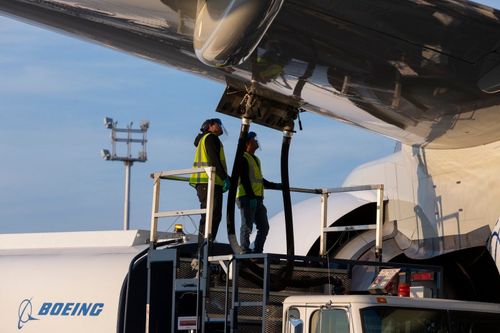Boeing, Wagner advance Australia’s SAF industry

SOURCE: Boeing
April 26, 2024
BY Boeing
Boeing and Wagner Sustainable Fuels will collaborate on growing the sustainable aviation fuel (SAF) industry to help meet Australia’s airline demand for jet fuel which is expected to increase by 75% over the next 25 years.
“Wagner’s sustainability goals align with Boeing’s work to advance aviation decarbonization and energy security through renewable energy including SAF, advanced technologies, operational efficiency, and fleet renewal,” said Kim Camrass, Boeing Australia, New Zealand & South Pacific sustainability lead.
“Our agreement is another step forward in realising the recommendations identified in the Boeing/CSIRO SAF Roadmap(opens in a new tab).”
Advertisement
Advertisement
The 2023 SAF Roadmap identified Australia’s prime position to develop a domestic SAF industry, by scaling the supply of SAF production while reducing costs, as well as the investment required in R&D to support emerging technologies.
“We’re working closely with the Australian Government’s Jet Zero Council to overcome the challenges required to build a domestic SAF industry, such as feedstock availability, supply chain constraints and aligning to international standards,” said Camrass.
Wagner Sustainable Fuels has commenced the design and construction of Australia’s first steady supply of SAF within the fuels’ precinct at the Wellcamp Airport in Toowoomba, Queensland, to blend SAF to international aviation regulations.
Advertisement
Advertisement
“In collaboration with Boeing, the Wellcamp blending facility will demonstrate the greenhouse gas emissions reduction benefits of SAF for our customers, provide a focus for federal and state policy makers and introduce the supply chain to this potential AUD$3 billion+ per year industry,” said Matt Doyle, CEO, Wagner Sustainable Fuels.
“We’re proud to contribute to the building blocks of a sovereign SAF production industry with this Australian-first facility and anticipate by the end of 2024, this facility will mark the start of the supply of SAF in Australia on a consistent basis.”
Unlike conventional jet fuel, SAF is produced from renewable sources – like agricultural waste, animal fats, vegetable oils and municipal solid waste – and significantly reduces carbon emissions over the fuel’s lifecycle, making it a more sustainable alternative for powering aircraft.
Related Stories
Shell Aviation, Accenture, and Amex GBT on July 10 announced Avelia is in the process of evolving to an industry solution with independent data hosting and a multi-supplier model helping users access the GHG benefits of SAF.
The U.S EPA on July 17 released data showing more than 1.9 billion RINs were generated under the RFS during June, down 11% when compared to the same month of last year. Total RIN generation for the first half of 2025 reached 11.17 billion.
Avia Solutions Group, the world's largest ACMI (aircraft, crew, maintenance, and insurance) provider, has partnered with DHL Express to reduce greenhouse gas emissions from its international shipments using SAF.
Bangkok Airways Public Company Limited has officially announced the adoption of sustainable aviation fuel (SAF) on its commercial flights, reinforcing Thailand’s green aviation industry. The initiative took effect starting July 1, 2025.
Avalon Energy Group LLC and Sulzer Chemtech have signed a strategic alliance and partnership agreement to scale up the production of SAF. Under the agreement, Avalon has selected BioFlux technology for its portfolio of SAF projects.
Upcoming Events










